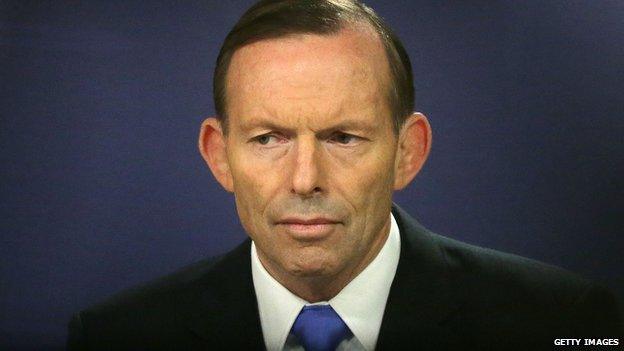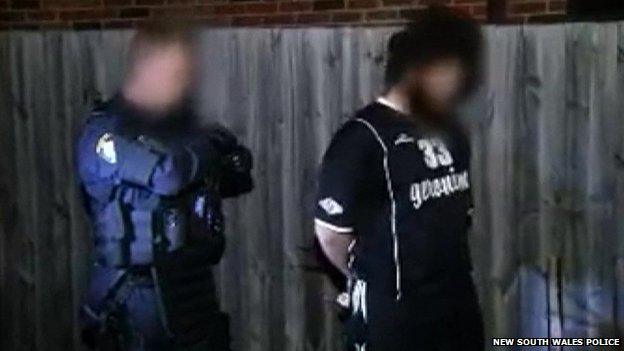Tony Abbott: 'Security may come before some freedoms'
- Published

PM Abbott: "The delicate balance between freedom and security may have to shift"
Australian PM Tony Abbott says certain freedoms may have to be forfeited in the name of security, after major anti-terror raids last week.
His government would seek broad powers to fight the rising threat of militant Islamists, he told parliament.
New laws would criminalise travel to conflict areas declared off limits.
Australian authorities believe at least 60 Australians are in the Middle East fighting with Islamic State (also known as Isil) and other militant groups.
Mr Abbott gave the example of an off-limit area as the city of Raqqa in northern Syria.
That is where a photograph was taken earlier this year and posted to social media of a young boy holding the severed head of a Syrian soldier. The boy is believed to be the son of an Australian jihadist.
"My unambiguous message to all Australians who fight with terrorist groups is that you will be arrested, prosecuted and jailed for a very long time; and that our laws are being changed to make it easier to keep potential terrorists off our streets," Mr Abbott said.
Laws to create new terrorism offences and to extend powers to monitor or detain suspects would be introduced to parliament this week, he said.
Legislation that would require telecommunication companies to provide data to police and security agencies would also be introduced soon.
"Regrettably for some time to come, the delicate balance between freedom and security may have to shift," he said.
"There may be more restrictions on some, so that there can be more protection for others."
'Kill kaffirs'

The raids are being called Australia's biggest anti-terrorism operation ever
Last week, police forces in Sydney and Brisbane conducted raids to disrupt alleged plans to publicly behead a randomly-selected Australian.
"An Australian Isil operative instructed his followers to pluck people from the street to demonstrate that they could, in his words, 'kill kaffirs'," Mr Abbott told parliament.
"All that would be needed to conduct such an attack is a knife, a camera-phone and a victim," he said.
One man has been charged with terrorism offences and several others arrested.
Last week, Australia sent 600 troops to join a US-led coalition to combat IS.
Mr Abbott will travel to New York later this week for a UN Security Council meeting where US President Barack Obama is expected to call for more countries to join the coalition.
Meanwhile, in a separate development, the Australian government has agreed to add torture to a list of specific prohibitions on secret service officers when detaining terror suspects.
It came after critics said officers should not be exempt from legal liability for torturing suspected terrorists.
Duncan Lewis, secretary general at Australia's top spy agency ASIO, said the organisation has never practiced torture and it never would.